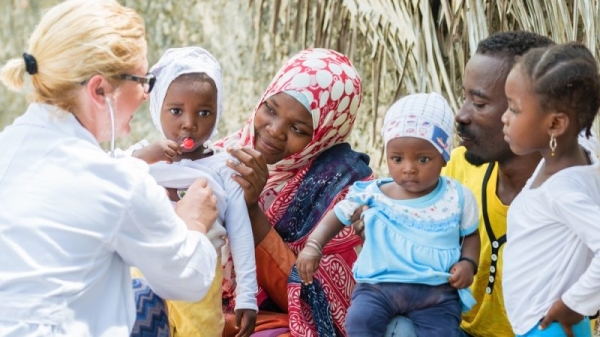COVID highlighted the need for sustainable public health systems in Africa

In 2022, vaccination against COVID-19 in Africa significantly increased and the number of cases dropped. But African public health experts say there is now a need for long-term investment.
At the end of January 2023, about 20,000 new cases of COVID-19 were recorded across the African continent, a 97% drop from January 2022, according to the World Health Organisation (WHO) figures.
This is due, among other things, to an acceleration of vaccination over the past 12 months, made possible in part by funds from the European Commission’s humanitarian program, Project ECHO.
The funds have been distributed to 16 countries and have been invested in communication campaigns, training of health workers and distribution of vaccines.
Although European funds have made it possible to accelerate vaccination, the ECHO project ends next month and will not necessarily allow for long-term sustainability.
For the 16 beneficiary countries regularly confronted with humanitarian emergencies and weak health systems, “this project is more like a band-aid”, Arsène Enyegue, project manager at WHO AFRO, told a symposium organised by the WHO in Dar Es Salaam, Tanzania, on 16-17 May.
Therefore the various heads of the WHO regional offices have warned about the need to go further. WHO AFRO called for integrating COVID-19 vaccination into primary health care and strengthening public health systems for the coming years.
“The key to sustainability is the integration of COVID vaccination with other primary health care,” Ian Van Engelgem, ECHO’s health adviser, said at the symposium.
As evidence, in Madagascar, the integration of COVID vaccination into community-based care over the past year has increased demand, confirmed Patricia Martin Rasoamihanta, head of the WHO office on the African island.

EU-AU summit makes big health promises, but not on IP waivers
EU and African leaders laid out a number of promises to secure equitable access to vaccines at the end of a two-day summit in Brussels on Friday (18 February). No decision on lifting intellectual property rights was reached, however.
More than half of Africans suffer from a lack of care
The weakness of public health systems in Africa, however, goes back much further than the pandemic.
According to the results of a survey released in 2020 by the Afrobarometer polling institute, 53% of Africans reported experiencing a lack of needed care at least once in the previous year even before the COVID-19 pandemic.
Since then, the pandemic has further weakened health systems on the continent. The main weak points are a lack of infrastructure, health care providers, budget, problems accessing hospitals, and sometimes exorbitant prices for care.
“In Madagascar, the health system is precarious and human resources are limited,” said Rasoamihanta.
Governments also have their share of responsibility. The Afrobarometer survey found that 46% of respondents felt that their government was not responding well to the need to improve basic health services.
In some countries, the money allocated to public health is sometimes misused.
This has been the case in Cameroon, where 180 billion CFA francs (about €275 million) earmarked for the fight against COVID-19 were misappropriated by the Ministry of Health, according to a report published in 2021 by the Supreme Court’s audit chamber.
“There is poor governance of the health budget. Some governments take it over without doing the job,” Enyegue said.
Beyond corruption scandals, the poor working conditions of healthcare workers are regularly the subject of finger-pointing.
In the Democratic Republic of Congo, healthcare workers received a bonus for vaccinating against COVID-19, but the bonus promised by the government during the last Ebola epidemic last August has still not been distributed.
“It is essential to increase the salaries of caregivers,” said Enyegue.

Health Brief: Unequal access to vaccines takes root in EU-AU summit
While health did not feature as a topic at the previous EU-African Union (AU) summit back in 2017, it certainly will do at the upcoming summit next week.
The EU’s political role
The European Commission also participates in the Global Fund to Fight AIDS, Malaria and Tuberculosis, which invests four billion dollars each year to combat these diseases, which makes it the sixth-largest donor to the Global Fund.
For the period 2023-2025, its pledge amounts to €715 million, representing a 30% increase over the period 2020-2022.
Most EU countries also finance the Fund. Together with the European Commission, they are known as “Team Europe” and account for a third of the Fund’s total funding.
France and Germany are Europe’s two biggest donors, having contributed €6.05 billion and €4.6 billion respectively since the Fund’s creation in 2002.
Beyond financial aid, the EU could also play a more political role, according to Enyegue, who explained that “the EU could put pressure on [African] states to increase the health budget”.
Read more with EURACTIV




